Detroit’s Obsidian Theatre Festival sets the stage for Black creatives to dream out loud with productions and conversations that explore multi-faceted Black, human stories through artistic expression including theater, music, and dance.

This season features four new stage plays––one being ‘The Golden Loc’ written by Prentiss Matthews III, and directed by Asia Mark. The story is about 10-year-old Zia who is bullied because of her locs. However, this stage play goes deeper and beyond the typical script of being bullied and the effects of that. Fused with Afro Fantasy, West African mythology, and Black spirituality, audiences enter a magical world where the four elements (earth, water, fire, and air) bring rumble and light and Aziza Fairies––African fairies who dwell in the forest with gifts of practical and spiritual knowledge, mastery of fire, survival skills, and wisdom that they impart on humanity to provide guidance––nurture but also lean on a young girl embracing her courage to step into her power, despite the voices and actions of peers who choose to ‘other’ her because of her crown.
It’s the morning of Juneteenth 2024 and this conversation with Prentiss and Asia dives into ‘The Golden Loc’ and the glory in taking up space in the arts to tell stories that offer a reimagined present and possible future. The Obsidian Festival will be live in Detroit June 27-30. Virtual screenings will begin in August. Learn more about the folks and festival here: obsidianfest.org.
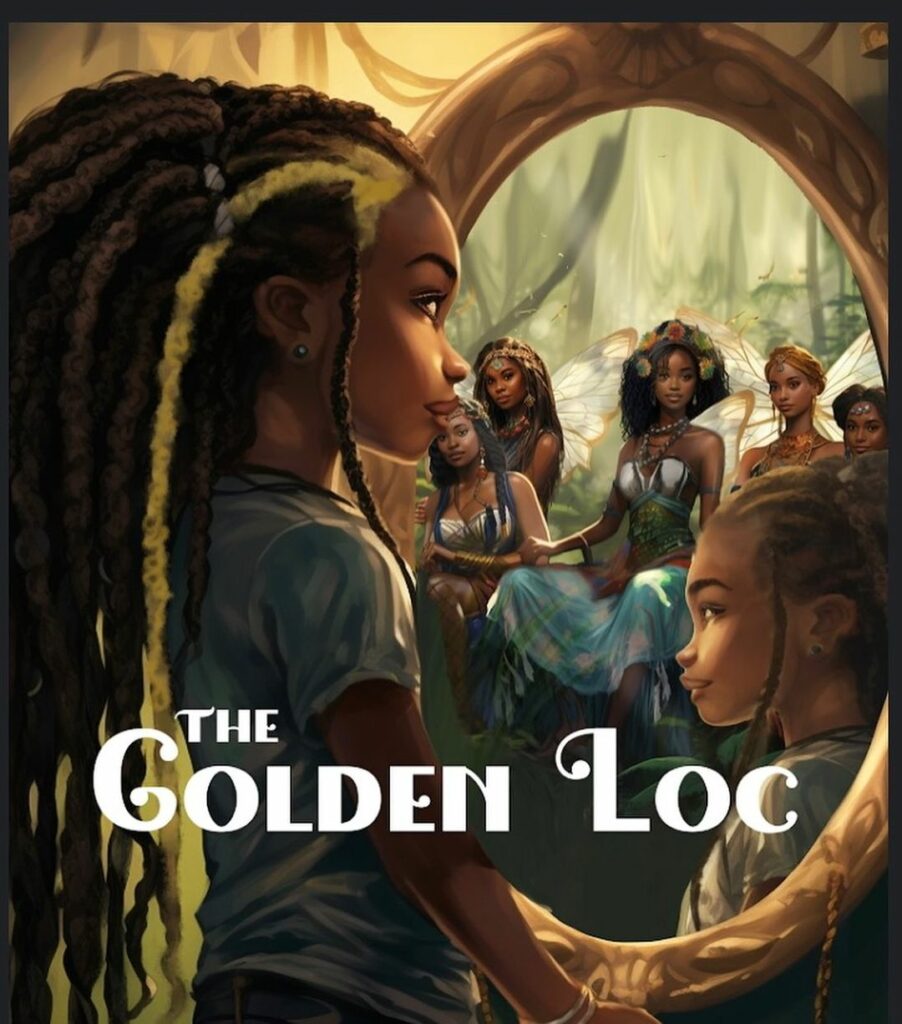
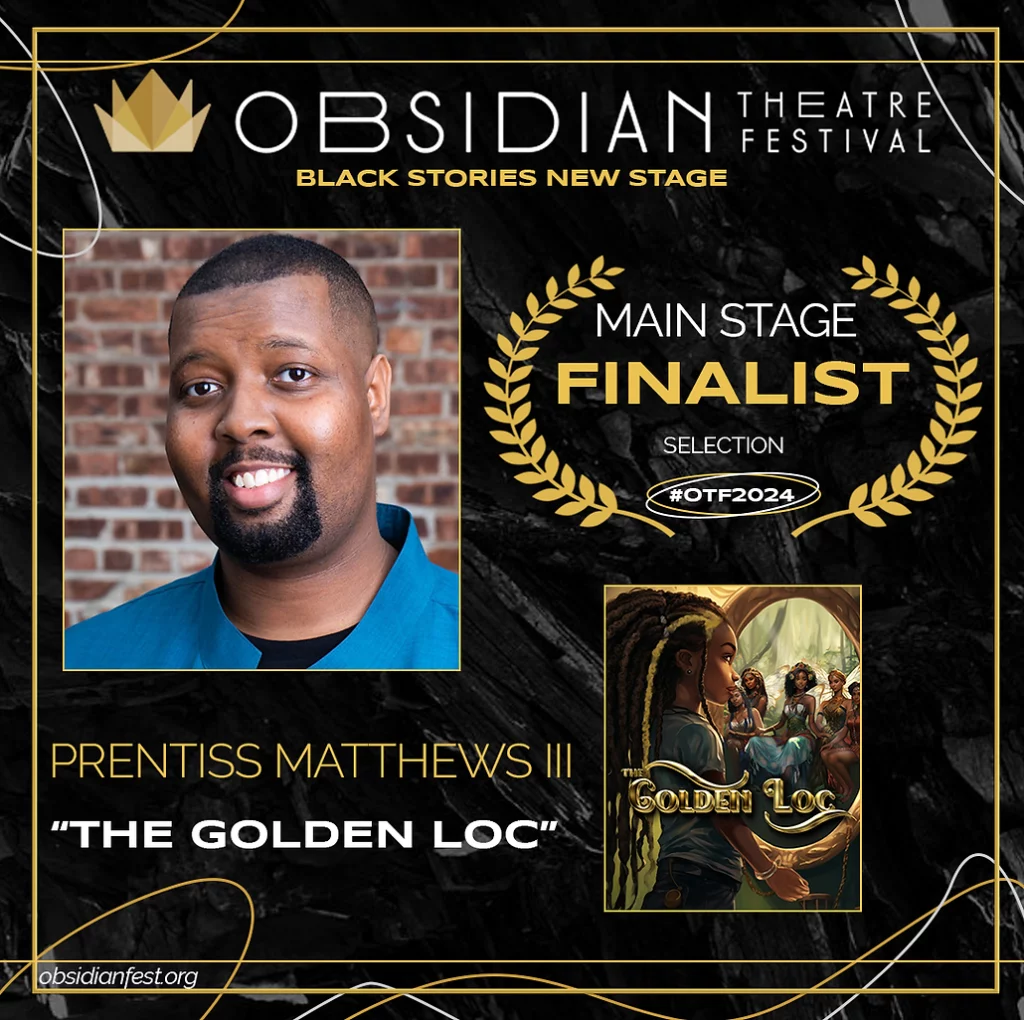
LaToya: What attracted me to ‘The Golden Loc’ first was that it is a youth production, and I just feel that it’s super important for youth to find the arts and creative ways of expression and development. Then, dealing with themes of spiritual blackness, Afro Fantasy, and mythology. Prentiss, as the playwright, can you take me into the writing and the resources that you collected to create the story and this production?
Prentiss: Yeah, I did a Google search for fun on African mythology. I was like, I want to look at Black people. I was doing research in Greek mythology for a show that I was in, and I was bored, and as I was looking, I saw Aziza fairies and I said ‘wait, Black people got fairies too!’ And I was like, I’m going to write a show about this. As I started researching Aziza fairies, I thought about my younger self, if he was watching this show. I was a kid who asked tons of questions. So, the first question I needed to answer is how are these Aziza fairies created? Oshun (*writer’s note: In Yoruba religion, Oshun is a goddess or river orisha associated with water, purity, sensuality, fertility, and love. She is considered as one of the most powerful deities) shows up because she is the creator of life, and I said ‘Ooh, she’s mother, she created these Aziza fairies. And I started writing the story from there.
LaToya: Going deeper into the character development – what is Zia’s story and journey through ‘The Golden Loc’? What poses a challenge to her, and what are some elements in the story that help her lean into who she is and what she’s capable of?
Prentiss: Zia is bullied in her classroom for having locs. She’s the only kid at her school who has them. And I wanted to create a world where misogyny, racism, all the isms, all the phobias don’t exist. So in the Kingdom, all these fairies, they represent ethereal Black women who are just magical and also have agency over who they are. And so they’re all like fairy godmothers for this young person, and they’re offering love and support. They also need her because if she doesn’t embrace her calling, they could cease to exist. So they need each other. In this journey, it is about self-love and empowerment; it’s about stepping into your calling and being unafraid of that.
In this journey, it is about self-love and empowerment; it’s about stepping into your calling and being unafraid of that. – Prentiss Matthews III, writer of The Golden Loc
LaToya: We talk about world-building a lot with Afro fantasy and mythology, and Asia, feel free to jump in on this as well, just in that world-building, where are we? How did you all create this world on stage and in character direction?
Asia: We’re using a lot of lights and sound to create this ethereal world and also physical movement. This is a big ensemble piece–it’s a big group piece, so there’s a lot of physical movement in dance that has been incorporated into this world, which is really cool because for these Black women, to be able to be in a room together, first of all is extremely rare. But also to be able to just move our bodies and move together cohesively within this world that we’ve created is really cool because we don’t always, in real life get the opportunity to do that. It’s a very spiritual journey. It’s really a blessing to be able to collaborate with costumes, props, and create this world with all of these different elements and also experience the elements through the writing as well. So it’s been a really great experience.
LaToya: Asia, when you received the script, what immediately jumped out to you? What did you see?
Asia: First of all, Zia having locs. I’ll be going on my second loc anniversary in August, but just this little girl who is bullied for her hair. I was bullied for my hair. I had longer hair. And then because it was getting pressed all the time, it broke off. So in seventh grade, I had to get my hair cut into a bob, and I remember coming to school with a hood on, and I took the hood off, and everybody just clowned me. My hair is something that I’ve struggled with for such a long time, along with a lot of other Black women and to see Zia looking at herself in that mirror and to not be able to see her beauty, but then to go to this queendom, untouched by white supremacy, and for her to find this community of Black women that help her to find her power, dig deep within herself and find this beauty, which has also been, I’ve been blessed to encounter Black women that have helped me along my journey to find myself, to connect to myself, to love my blackness, to love my hair.
And so for me, Prentiss says that this is a love letter to Black women, and it really truly is. I have a daughter, she comes to rehearsal, she’ll be four. And just for her to go back home and recite some of the words from the play, I am powerful. I can do this. I can do anything. That is so next level for me, especially on stage, not growing up, seeing Black people on stage period, but then for this to be this Black queendom is just really some next-level stuff. So that’s really what stood out to me the first time that I read it.
LaToya: Prentiss, diving into this world and creating a character like Zia – stepping into that mind frame and existence of a 10-year-old girl on a complex growth journey, what compelled you to tell this story, in this way?
Prentiss: There’s so many things. I’ll start with Zia, my niece, she’s 25 now, but we grew up together, we’re close, and she would come to me and tell me stories about her issues with colorism and how she felt judged for her skin complexion, her hair. My mom shared the same stories. And then my other friends who are Black women also share the same story. And I always would see it and I’m like, I hear you, but you’re so powerful and beautiful. I always loved them for who they were. So, when I wrote this piece, it was to showcase my love for my niece, my best friend, and my mom, giving them space to see a show where they’re represented. Also, I’ve studied theater. I have done theater since I was nine, and I’ve never seen a show like this. I did the extra stuff, went to school, did all of it, and still didn’t see any work like this. I feel like Black kids deserve an imagination. They deserve space to see a show where they’re represented and they’re powerful. And Black women can play multifaceted characters. That’s what inspired this piece.
I feel like Black kids deserve an imagination. They deserve space to see a show where they’re represented and they’re powerful. And Black women can play multifaceted characters. That’s what inspired this piece. – Prentiss Matthews III, playwright of The Golden Loc
LaToya: As we think about the story and script, the language, what is, a piece of the language or the dialogue that anytime you hear it in rehearsal, you see it on stage, you’re reading it yourself, that presents a visceral feeling and effect. Maybe it’s the overall messaging of the production, but is there a part in the language that resonates with you anytime you hear it or you read the words?
Asia: For me, I am a warrior. I can do anything. There’s several moments where Zia, she’s given an heirloom from her mother, it’s a necklace. And her mother teaches her that whenever she feels scared or insecure, she can grab onto her necklace and say, I am a warrior. I can do anything. And throughout the play, we see Zia grab onto that necklace and she starts off not really believing, but by the end of the play, when she grabs that necklace, you can see that she’s really grown into herself and grown into her power. And so she eventually really believes that. And for a Black girl to come and see a play where there’s a Black girl on stage saying, I am a warrior. I can do anything, that is so beautiful. And it’s something that I’m going to have my daughter say, because to truly understand you are a warrior and you can truly do anything just to have that verbiage in your mind, that’s a really big deal. That is probably the biggest quote that stands out to me throughout the play.
LaToya: Oh, nice!
Prentiss: Yes. I love that one. I also love: rest is powerful.
LaToya: Talk about it (lol)
Prentiss: Especially today on Juneteenth, because a lot of Black people work, work, work, work, work. I think about that scene from Scandal. You gotta work twice as hard…
LaToya: Whew! That monologue, okay.
Prentiss: And I’m like, I’m not just talking to the Black girls in the audience. I’m talking to their moms too. Like, ‘Hey, rest is powerful.’ You can take a day off and the work will get done. It’s okay. I think about my mom. I was raised by a single mom and she worked all the time, and she deserves rest. So it is a message for both the girls and the women, also anybody who overworks. Rest is powerful. That’s one of my favorites.
LaToya: And then just the final thing that came to mind…Black visibility in the theater space and the opportunities you’re seeing arise–the Obsidian Festival being one of them––and how this further empowers your practice of storytelling, and the types of stories you choose to tell.
Asia: For me, it’s really beautiful being from Detroit because several companies are founded by Black people who have clearly seen there is a need to create a company where Black stories can be told, where Black stories can be uplifted. This is my second season working with Obsidian and it has been such a blessing because there are so many different ways to tell our story. And there are so many different Black stories. For this theater company to accept submissions from Black playwrights and then put these plays on stage is so next level. And this particular play, I know I mentioned it earlier, but there was only one other time that I’ve done a show where it was all Black women. It was for a week, and I will never forget it for as long as I live.
And this experience, it’s all Black women. Not only is the director a Black woman, but the stage manager is a Black woman as well. And you just don’t see that. So for us to have community, we circle up at the beginning of rehearsal, we do check-ins. That’s probably the only time that some of these women have the opportunity to just get stuff off of their chest, the weight of the day, the weight of the week. To build a community like this, it’s so much more than just putting our stories on the stage––that’s important, of course––but it’s also about what happens in the room. And so it’s really beautiful to have spaces like Obsidian to walk in the room and know, okay, we understand what the culture is, we can create the culture, and we can create a safe space because it’s just us. And that is a very rare thing that I do not take for granted.
To build a community like this, it’s so much more than just putting our stories on the stage––that’s important, of course––but it’s also about what happens in the room. And so it’s really beautiful to have spaces like Obsidian to walk in the room and know, okay, we understand what the culture is, we can create the culture, and we can create a safe space because it’s just us. And that is a very rare thing that I do not take for granted. – Asia Mark, director of The Golden Loc
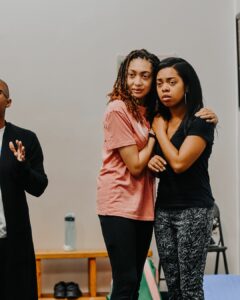
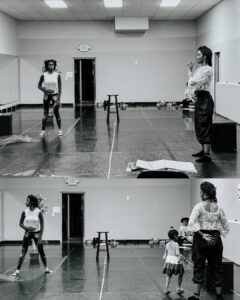
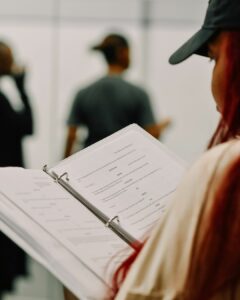
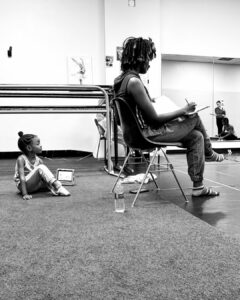
Prentiss: Beautiful. Yes. I love that. Yeah. I also just want to say this is my first time working with the ObsidianTheater Festival, so I’m honored to be here. And also I come from Georgia and being here, this isn’t my only play. I’ve written other plays before. And actually before that I wrote plays for adults, like an adult audience. So this is my first play for families and kids. But what I have seen in theater, there’s always like, oh, we want to be diverse, but there’s always hesitation and it’s frustrating. And so for me, I always had to create my own space. I had to produce my own work for years in order for people to see it. And this is the first time where I submitted my work, and I don’t have to do anything but show up and be a playwright. And it’s a really beautiful experience for me because I’m so used to casting and directing and scheduling and coordinating, and I have to work twice as hard to get a few people to say, oh, he’s good.
So the short version of what I would say is we are making strides, and I’m glad that I’m a part of this festival. I want to see more festivals doing this type of work, and I want to continue creating space not only for artists like me, but also artists beyond me. So yes, I am a man. My pronouns are he, him, his, and I can see the beauty in Black femininity and create space for them. And I can say, ‘Hey, I wrote this for you. I’m going to leave. You got it. You got it. I’m going to leave. Bye.’
LaToya: Thank you. Is there anything that you all want to share or talk about regarding ‘The Golden Loc’ production or just in your personal journey that we didn’t cover in this conversation?
Asia: I’m just grateful. I’m grateful for this opportunity to uplift Prentiss’ words. I’m grateful that the words came to you, Prentiss. It’s such a spiritual art and a spiritual thing for me, and it’s for all of the women in the room. I think it’s okay for me to say that it has been an extremely spiritual and beautiful experience and a necessary experience for all of us at this particular time in our lives. And I really believe that this play will live on for a long time because, there’s a part of me that wants to say it’s ahead of its time, but it’s not ahead of its time. I think it’s right on time because we are seeking to see ourselves on stage. We are seeking to see ourselves in the world. And so I’m just grateful for this opportunity to be among the community in this way. And I’m just really excited for everyone to see it. And it is streaming!
Prentiss: The last thing I’ll say, for me, Afro Fantasy was created for rest. So the goal is we’re taking a break from white supremacy. White supremacy is not the big bad in this show, and I feel like we need to see that. And I also want to see superheroes. I want to see Black nerds. I just want space for us to exist freely and to show Blackness in different ways, magical and beautiful ways for us not to serve anyone else but us.
The Obsidian Festival will be live in Detroit June 27-30. Virtual screenings will begin in August. Learn more about the folks and festival here: obsidianfest.org.
About the Author
LaToya Cross
LaToya “toi talese” Cross is an arts and culture writer and producer whose work has been featured by WDET 101.9FM – Detroit’s NPR Station, Essay’d, EBONY, JET, SouthSideWeekly.com, blkcreatives.com. She is passionate about telling stories that center creatives using their platform to shift, shape, and analyze culture through an artistic lens.
